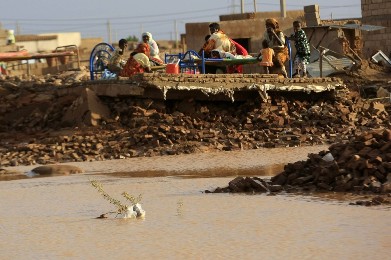Sudanese states ask for federal help to stave off flood effects
July 27, 2014 (KHARTOUM) – Sudan’s River Nile and Sennar states have asked the federal government for assistance to overcome the serious damage caused by heavy rains.

He said that a high committee headed by his deputy, Ali Ahmed Hamed, has been set up to assess the damage besides forming popular committees to provide help and support for the affected population.
The governor appealed to government units concerned with humanitarian and voluntary work beside the federal emergency committee to provide the needed assistance to shelter the affected.
One person was killed and 12 others injured and dozens of homes were destroyed in the River Nile state due to heavy rains and floods.
Floods also led to isolating more than 60 villages in Sidoon area on Atbara River and cut off the road linking these villages and the city of Atbara in the River Nile state.
The Humanitarian Aid Commission (HAC) disclosed that 1,000 people have been completely affected by the heavy rains while 1027 others were partially affected in Sinnar state.
HAC’s head of food security and emergency director, Mutasim Abu al-Gasim said that Sinnar state need 1000 water , various types of drugs, 100 tent, 2000 Mosquito nets, and 2000 blankets, stressing there were no losses in government units, hospitals, harvest, and lives.
Meanwhile, the commissioner of Al-Gouz locality in South Kordofan state, Abu Bakr Khalifa, said the heavy rains on Saturday had cut off the road linking North Kordofan state capital, El-Obeid to South Kordofan state capital Kadugli besides the bridge over the railway in Al-Hamadi area in the locality of Al-Gouz, pointing there were no casualties.
Khalifa told the official news agency SUNA that efforts are underway to rebuild the road, noting they are looking for temporary roads until the road is fixed.
The commissioner of Abu-Hamad locality in the Northern state, Tarig Farah, has warned against cutting off the highway linking Al-Shiraik area and Abu-Hamad, saying the finance ministry did not provide the necessary fund to rebuild the road.
He disclosed the road was cut off in three areas since last falls, including Khor Amor, kilo 110 and the area which is located 25km north of Abu-Hamad.
The government-sponsored Sudan Media Center (SMC) said on Sunday that buses and private vehicles might not be able to use the side roads because they lie on lowlands that are threatened to be immersed by rain and flood waters.
Heavy floods on Friday had cut off the highway linking Khartoum to Port Sudan and disrupted travel to and from the capital.
Sudan’s General Authority for Meteorology (GAM) advised residents to get cautious and evacuate lowland areas and floodplains besides avoiding night travel.
It said rain is expected to fall across the country, predicting Khartoum would witness medium and light rain besides cloudy weather during this week.
GAM’s weather forecast expert, Mohamed Shareef Mohamed Zain, said the Inter-Tropical Convergence Zone (ITCZ) would pass north of the city of Dongola in the Northern state and progresses northward which indicates rainfall in all Sudanese states.
He advised citizens to travel during the day in order to avoid night rainfall which could cause accidents in highways.
Zain said that temperatures in Khartoum state will continue to fall, saying the lower will be between 22 to 25°C and the higher between 35 to 37°C.
Meanwhile, the Sudanese Company for Electricity Distribution (SCED) called for making the necessary precautions to avoid electrocution caused by rain.
The SCED acknowledged that 33 people were killed by electrocution during the 2013 fall season.
Heavy floods have been common in the past few years in Sudan’s east along the Blue Nile but happen more rarely in the capital and the north where much of Sudan’s population live.
Floods and rains that hit different areas in Sudan last year lead to the death of at least 38 people and injured dozens.
Rains which fell during the past 72 hours have turned Khartoum into a pond of water amid widespread anger over what is perceived as an inadequate government response.
(ST)
